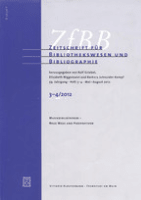
ZEITSCHRIFT FUR BIBLIOTHEKSWESEN UND BIBLIOGRAPHIE
Scope & Guideline
Exploring Innovations in Library and Information Practices
Introduction
Aims and Scopes
- Provenance Research:
A core focus of the journal is on provenance research, which investigates the history of ownership of cultural artifacts and collections. This includes methodologies for tracing the origins of items in libraries and archives, as illustrated by various papers discussing projects and case studies. - Digital Transformation in Libraries:
The journal consistently explores the impact of digital technologies on libraries, examining challenges and opportunities presented by digitization, data management, and digital collections. This includes discussions on tools, strategies, and collaborative frameworks for enhancing library services. - Information Literacy and Education:
A significant aim is to promote information literacy and its role in education. The journal discusses initiatives, programs, and research aimed at improving the public's ability to access and critically evaluate information, which is crucial in the digital age. - Cultural Heritage and Preservation:
The journal addresses issues related to the preservation of cultural heritage, focusing on the role of libraries in safeguarding historical documents, manuscripts, and other significant cultural artifacts. This encompasses discussions on archival practices, restoration techniques, and collaborative preservation efforts. - Library Management and Policy:
The journal provides insights into library management practices and policies, discussing organizational structures, funding models, and governance in the context of evolving societal needs and technological advancements.
Trending and Emerging
- Collaborative Initiatives in Libraries:
There is a growing trend towards collaboration among libraries, institutions, and researchers, particularly in the context of shared resources, joint projects, and collective efforts in digitization and preservation. - Open Science and Data Sharing:
The journal increasingly emphasizes the importance of open science and the sharing of research data. This reflects a broader movement towards transparency, accessibility, and collaboration in the research community. - Artificial Intelligence and Libraries:
Recent publications explore the integration of artificial intelligence in library services, including its applications in cataloging, user interaction, and enhancing research support, indicating a forward-looking approach to technology. - Sustainability and Libraries:
There is an emerging focus on sustainability within library practices, addressing how libraries can contribute to environmental stewardship and promote sustainable practices in their operations. - Impact of Social Media on Information Access:
The journal is beginning to explore the implications of social media on information dissemination and access, considering how these platforms affect user engagement and information literacy.
Declining or Waning
- Traditional Bibliographic Practices:
There appears to be a waning interest in traditional bibliographic practices, such as physical cataloging and classification systems, as the field increasingly embraces digital tools and data-driven methodologies. - Physical Library Spaces:
Discussions centered around the physical aspects of library spaces and their architectural significance have diminished. This decline may correlate with the growing emphasis on virtual and digital library services. - Historical Library Studies:
Research specifically focused on the historical aspects of libraries, such as their role in past societies or detailed historical accounts of library development, has become less frequent, potentially overshadowed by contemporary issues. - Printed Materials and Print Culture:
There is a noticeable reduction in papers addressing print culture and the significance of printed materials, as the conversation shifts towards digital media and the implications of digital access. - Single-Discipline Focus:
Papers that concentrate solely on one discipline within library science (e.g., law libraries or medical libraries) are becoming less common, with a trend towards more interdisciplinary approaches that integrate various aspects of library science.
Similar Journals

Investigacion Bibliotecologica
Empowering Knowledge Sharing in Library and Information SciencesInvestigacion Bibliotecologica, published by the National Autonomous University of Mexico, stands as a vital resource in the field of library and information sciences. With a legacy of open access publishing since 1986, this journal endeavors to disseminate high-quality research which aims to advance knowledge and practices within the library and information sector. With an ISSN of 0187-358X and E-ISSN 2448-8321, it has secured its position in the competitive landscape of scholarly communication, earning a commendable Q3 ranking in its category as of 2023. The journal's influence is reflected in its Scopus ranking within the library and information sciences field, where it ranks #151 among 280 journals. Located in Mexico City, it provides scholars, professionals, and students with open access to its content, facilitating knowledge sharing and academic collaboration. As it continues its publication journey from 2008 to 2024, Investigacion Bibliotecologica remains an essential platform for innovative inquiries, practical insights, and the latest developments in library science.
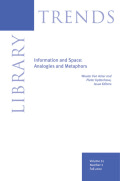
LIBRARY TRENDS
Innovating Practices for a Digital AgeLIBRARY TRENDS is a leading academic journal published by Johns Hopkins University Press, dedicated to the field of Library and Information Sciences. With an established history spanning from 1980 to 2023, this peer-reviewed journal provides a platform for insightful research, innovative practices, and critical analysis addressing contemporary issues in library science. While it holds a respectable Q3 quartile ranking within its category, it ranks #145 out of 280 in Scopus, indicating its significance in the academic community. With an impact factor that reflects the growing importance of the field, LIBRARY TRENDS invites contributions that encompass a wide range of topics, including digital libraries, information technology, and user studies. Although it is not an open-access journal, the content it provides is invaluable for researchers, professionals, and students seeking to enhance their understanding and improve their practices in the rapidly evolving landscape of library and information science. Discover more by exploring the latest issues and join the vibrant discourse shaping our information ecosystems.

DESIDOC Journal of Library & Information Technology
Innovative Insights for the Future of Information ManagementDESIDOC Journal of Library & Information Technology, published by the Defence Scientific Information Documentation Centre, is a pivotal scholarly platform in the realm of Library and Information Sciences. The journal, indexed with ISSN 0974-0643 and E-ISSN 0976-4658, has established its reputation with a commendable Q3 category ranking in the latest Scopus quartiles and a notable rank of 113 out of 280 in its field, placing it in the 59th percentile. Engaging a global audience, it disseminates high-quality research insights aimed at advancing the practices and technologies within library and information management. Operating within a converged timeframe from 2012 to 2024, the journal is committed to fostering robust discussions surrounding contemporary issues in the field, making it an invaluable resource for researchers, professionals, and students alike. While currently not offering open access, its content is accessible through institutional subscriptions, reinforcing its significance in the academic community of India and beyond.
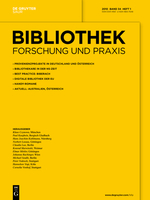
Bibliothek Forschung und Praxis
Elevating Scholarly Dialogue in Information ScienceBibliothek Forschung und Praxis is a distinguished journal in the field of library and information science, published by WALTER DE GRUYTER GMBH. With its ISSN 0341-4183 and E-ISSN 1865-7648, this journal provides a vital platform for researchers, professionals, and students to explore the latest developments, innovative practices, and theoretical advancements in library research. Situated in the academic hub of Berlin, Germany, the journal encourages submissions that address a wide array of topics pertinent to libraries, archives, and information services, aiming to foster dialogue and collaboration within the global academic community. Although it currently does not offer Open Access options, the journal ensures rigorous peer-review processes uphold the integrity and scholarly quality of published works. With a commitment to enhancing the field of library science, Bibliothek Forschung und Praxis plays a crucial role in shaping best practices and promoting deeper understanding among scholars and practitioners alike.
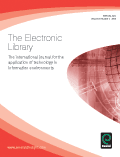
ELECTRONIC LIBRARY
Transforming Information Practices for TomorrowELECTRONIC LIBRARY, published by EMERALD GROUP PUBLISHING LTD, serves as a pivotal resource in the realms of Library and Information Sciences as well as Computer Science Applications. Established in 1983 and continuing through 2024, this journal showcases critical research and developments that shape modern information practices and the utilization of electronic resources. With a respectable impact factor positioning it in the Q2 quartile for Library and Information Sciences and Q3 for Computer Science Applications, the journal ranks #57 out of 280 in its field, reflecting its significance within the scholarly community. Authors are encouraged to contribute innovative studies that engage with current challenges and technological advancements, ensuring that the ELECTRONIC LIBRARY remains at the forefront of academic discourse. While the journal does not currently offer open access options, it remains an essential subscription-based resource for researchers, professionals, and students seeking to deepen their understanding of digital libraries and information management.
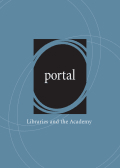
PORTAL-LIBRARIES AND THE ACADEMY
Bridging Gaps Between Information Access and Higher LearningPORTAL: Libraries and the Academy is an esteemed academic journal published by Johns Hopkins University Press, focusing on the intersection of library and information science, academic practice, and scholarly communication. With an ISSN of 1531-2542 and an E-ISSN of 1530-7131, this journal offers rigorous peer-reviewed research essential for librarians, researchers, and information professionals committed to enhancing academic libraries and fostering innovative practices in higher education. It holds a strong position in its field, ranking in the 61st percentile within Social Sciences and Library and Information Sciences, and categorized as Q2 in both Development and Library and Information Sciences for 2023. Though the journal is not Open Access, its content is invaluable for anyone interested in staying abreast of the latest trends and challenges in library services and academic environments. Since its inception in 2001, PORTAL has continuously contributed to the discourse on the evolving role of libraries in academia, making it a critical resource for those striving to bridge the gap between information access and higher education pedagogy.
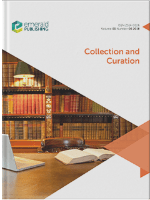
Collection and Curation
Cultivating Knowledge through Rigorous ScholarshipCollection and Curation is a prominent academic journal published by EMERALD GROUP PUBLISHING LTD, dedicated to the fields of Library and Information Sciences and Museology. With a significant impact in its domains, the journal has achieved a category quartile ranking of Q3 in Library and Information Sciences and Q2 in Museology as of 2023. It is noteworthy that in the Scopus rankings, it stands at an impressive #8 out of 83 in Museology, placing it in the 90th percentile, while also ranking #112 out of 280 in Library and Information Sciences, positioning it within the 60th percentile. Since its inception in 2018, the journal has been instrumental in advancing research and discussion around the critical themes of collection development and curation methodologies. Although it currently does not offer open access, the journal's rigorous peer-review process ensures high-quality scholarly contributions that are indispensable for researchers, professionals, and students aiming to enrich their understanding and practices in these important fields. By focusing on innovative strategies, practices, and case studies, Collection and Curation continues to shape the future of information management and museum studies.
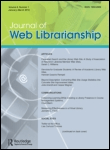
Journal of Web Librarianship
Connecting Knowledge and Technology in Library ScienceWelcome to the Journal of Web Librarianship, an esteemed publication dedicated to the evolving landscape of library science and information technology. Published by Routledge Journals, Taylor & Francis Ltd, this journal serves as a vital platform for researchers and professionals to share innovative practices, methodologies, and research findings in the fields of Library and Information Sciences and Computer Science Applications. With an impressive impact factor reflected in its 2023 rankings—Q1 in Library and Information Sciences and Q2 in Computer Science Applications—the journal is well-positioned to influence the discourse and development within these disciplines. Since its inception in 2007, the Journal of Web Librarianship has continually contributed to the academic dialogue, ensuring a comprehensive understanding of the critical role that web technologies play in library services. Though it is not an open-access journal, it remains an invaluable resource for those dedicated to advancing the practice and theory of web librarianship. Join us in exploring the intersections of information and technology as we work towards a more informed society.
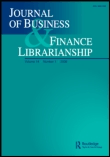
Journal of Business & Finance Librarianship
Unlocking Insights for Today's Information ProfessionalsJournal of Business & Finance Librarianship is a pivotal resource for those engaged in the multidisciplinary fields of library and information sciences, e-learning, and marketing management. Published by Routledge Journals, Taylor & Francis Ltd, this journal serves as an essential platform for scholars, librarians, and business professionals seeking to explore the intersection of finance and librarianship. Established in the early 1990s, it has evolved its scope to address contemporary challenges and innovations in business information management, particularly relevant in today's digital age. Despite not being an Open Access journal, its quality is evidenced by its robust standing, holding a Q2 rank in Library and Information Sciences in 2023. With an emphasis on providing empirical research and practical solutions, the Journal of Business & Finance Librarianship is an invaluable tool for advancing knowledge and expertise in the library profession and finance sectors.

Nauchnye i Tekhnicheskie Biblioteki-Scientific and Technical Libraries
Navigating the Frontiers of Library and Information ScienceNauchnye i Tekhnicheskie Biblioteki-Scientific and Technical Libraries is a vital resource in the field of library and information science, particularly focusing on the integration of scientific and technical knowledge within library services. Published by the Russian National Public Library Science & Technology, this journal serves as a platform for researchers, professionals, and students to explore innovative approaches in library management, information dissemination, and technological advancements that shape the future of scientific libraries. With the ISSN 0130-9765, the journal aims to promote scholarly communication and provide insights into the latest trends and methodologies in the realm of scientific and technical libraries. Though currently not designated as an open-access journal, its content is an important contribution to the body of literature that supports the evolution of library services in the fast-paced information age. Located in Moscow, Russia, the journal embodies a commitment to enhancing the scientific community's access to quality library resources, thereby fostering a culture of knowledge sharing and continual professional development.